Top 5 Ecommerce CMS to Start a Website
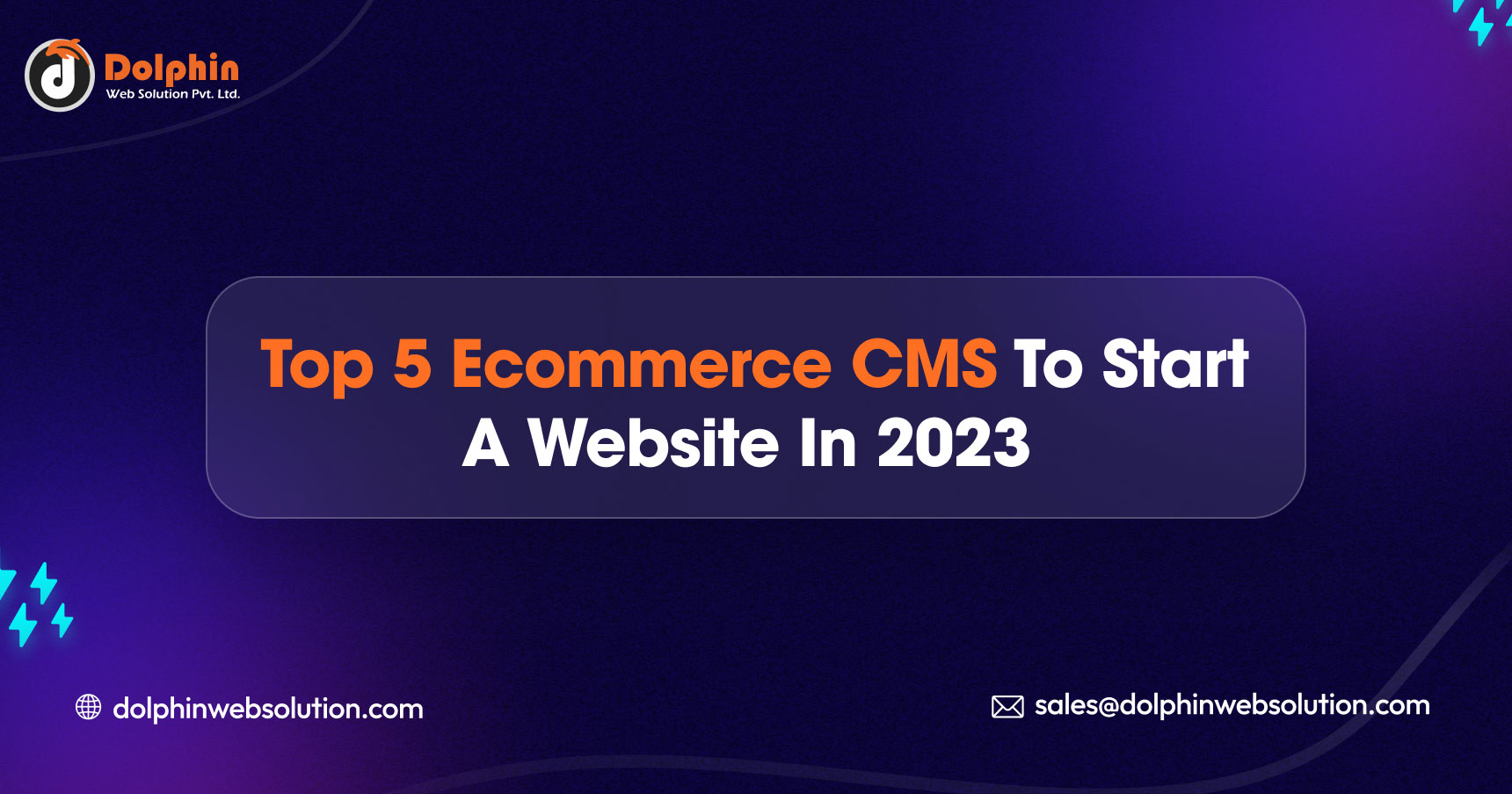
Table of Contents
Summary :
Are you looking to debut an online store in 2023? See our top 5 selections for online stores' finest content management systems (CMS). These CMS platforms provide everything you need to launch and expand your online business, from user-friendly interfaces to powerful features like inventory management, SEO optimization, and secure payment integration. Use these leading Ecommerce CMS solutions to launch your online business confidently.
Introduction
Both online businesses and dominant will be in the digital industry in 2023. Don’t look elsewhere! Successful e-commerce websites need a dependable and user-friendly content management system in today’s fast-paced environment. You can hire an ecommerce developer to create a fantastic website, whether an aspiring or experienced company owner seeking a new beginning. Everything you need to have a solid online presence and significantly increase your sales this year, along with the top five e-commerce content management systems.
What is Ecom CMS?
You can generate, format, save, and publish website content using most CMS platforms more efficiently. However, a CMS explicitly created for e-commerce is a little different. A CMS for e-commerce focuses on assisting you in setting up your online store. You can add advertising banners, make product listings, and build, update, and publish product pages.
An ecommerce store For your audience to purchase your products online through your website, CMS turns into a shopping cart solution. On your end, it enables you to control the promotion, display, administration, and sale of goods. It is an easy-to-use solution that aids in all the back-end store management required to run an online store.
Why Do You Need CMS for Ecommerce Websites?
There are several reasons for Content management systems :
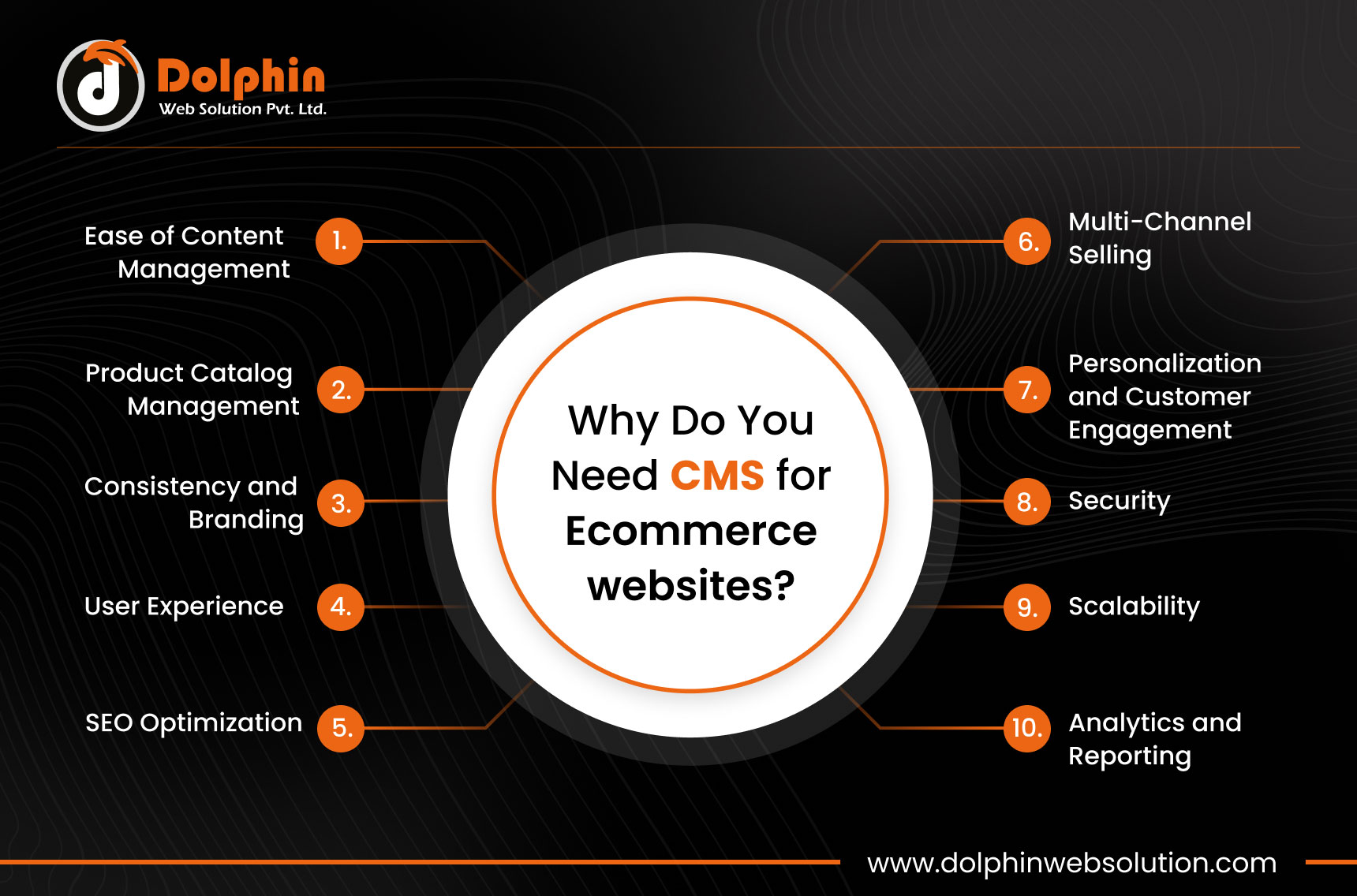
- A content management system (CMS) enables quick adjustments and real-time updates by making it simple to manage product listings, descriptions, prices, and other material without technical expertise.
- A lot of things are frequently available on e-commerce websites. Thanks to a CMS’s organized presentation of these products, customers may easily search and locate their needs.
- CMS platforms provide user-friendly interfaces that make it simpler for non-technical users to operate the website and minimize the requirement for in-depth coding expertise.
- A CMS can manage inventory, integrate payments, and process orders, improving e-commerce operations and providing a positive user experience.
- CMS solutions frequently come with SEO tools that aid with content optimization for search engines, enhancing visibility and drawing in more potential clients.
- Ecommerce firms may grow over time, and a CMS makes it simple to scale and customize to fit changing demands and specifications.
- A secure shopping experience for clients is made possible by the regular security updates and patches applied to many CMS platforms.
- CMS systems make it simpler for teams to collaborate on creating and maintaining content by enabling many users with various roles and rights to access the website.
Best eCommerce CMS for Your Online Business
1. Shopify
A CMS platform designed exclusively for online retailers is called Shopify. It’s tremendously solid and well-equipped as a result. Because it helps you save time and work, it’s one of the best ecommerce CMS platforms.
As an illustration, once you’ve created your website on Shopify, you may also host it there. You can save the hassle of purchasing a domain name and web hosting by doing this.
Additionally, their vast App Store contains helpful plugins for anything the core platform doesn’t cover. Even a beginner user of computers may simply develop their online business using Shopify’s site builder. There are many different templates and themes available. However, skilled Shopify developers can customize Shopify stores because the platform lets users alter their CSS and HTML code.
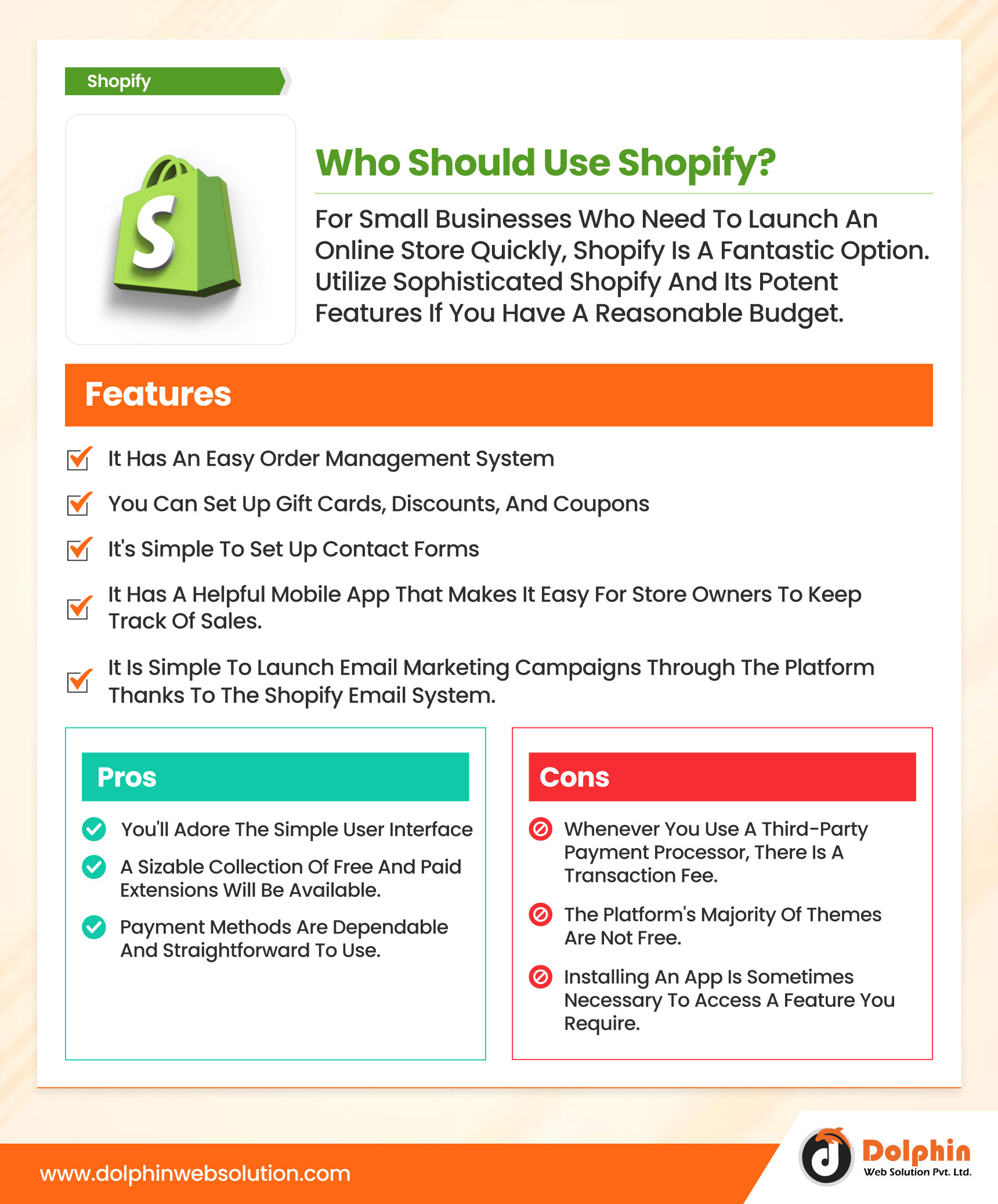
Features:
- It has an easy order management system
- You can set up gift cards, discounts, and coupons
- It’s simple to set up contact forms
- It’s simple to integrate with your social media accounts
- It has a helpful mobile app that makes it easy for store owners to keep track of sales
- It is simple to launch email marketing campaigns through the platform thanks to the Shopify Email system
Pros:
- You’ll adore the simple user interface
- A sizable collection of free and paid extensions will be available
- Payment methods are dependable and straightforward to use
Cons:
- Whenever you use a third-party payment processor, there is a transaction fee
- The platform’s majority of themes are not free
- Installing an app is sometimes necessary to access a feature you require
Who Should Use Shopify?
For small businesses who need to launch an online store quickly, Shopify is a fantastic option. Utilize sophisticated Shopify and its potent features if you have a reasonable budget.
2. Woocommerce
As a WordPress plugin, WooCommerce is a well-liked and potent e-commerce Content Management System (CMS). It gives companies a versatile and configurable platform to create and manage online stores. WooCommerce offers merchants of all sizes the tools they need to build e-commerce websites that are expert-quality, feature-rich, and easy to use, thanks to its wide selection of themes, plugins, and integrations. It also provides safe payment methods and shipping alternatives. Additionally, WooCommerce’s vibrant community and consistent upgrades guarantee that it will always be a cutting-edge option for companies trying to build a solid online presence and increase sales.
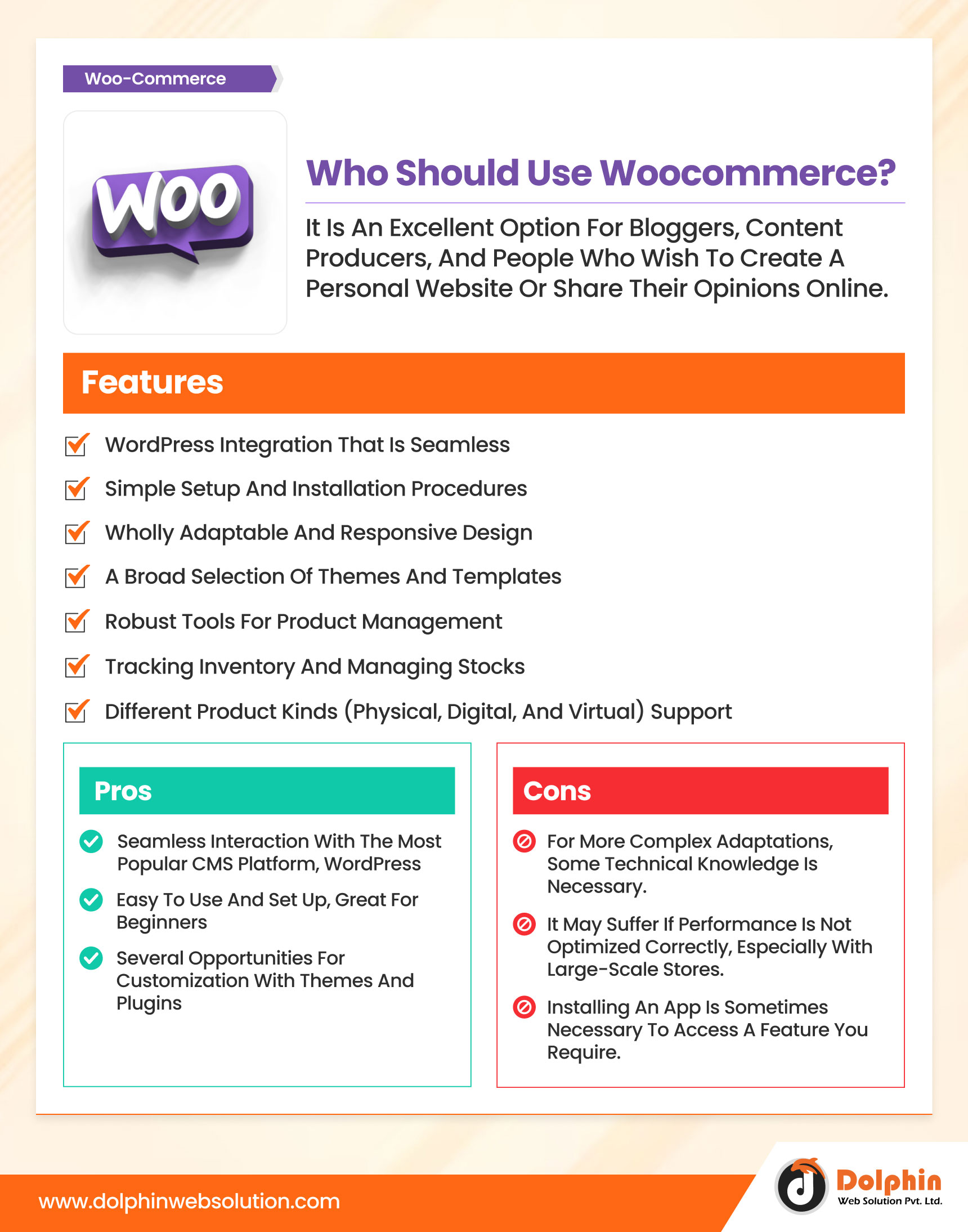
Features:
- WordPress integration that is seamless
- Simple setup and installation procedures
- Wholly adaptable and responsive design
- Broad selection of themes and templates
- Robust tools for product management
- Tracking inventory and managing stocks
- Different product kinds (Physical, digital, and virtual) support
- Shipping rates and adaptable shipping options
- Integration of secure payment gateways (such as PayPal and Stripe)
- Ratings and reviews from clients
- Built-in discount and coupon features
- Detailed updates on sales and performance
- Support for multiple languages and currencies
- Cellular-friendly and SEO-optimized
- Scalable and appropriate for all sizes of businesses
- Community activity and frequent updates for ongoing development
Pros:
- Seamless interaction with the most popular CMS platform, WordPress
- Easy to use and set up, great for beginners
- Strong community backing and a considerable extension library
- Strong product management skills
- Updates and security patches regularly to enhance performance and safety
- SEO-optimized and mobile-friendly for improved search engine exposure
- Comparatively inexpensive versus other e-commerce sites
- Broad understanding of various product types and product ranges
- Integration with well-known payment processors and delivery choices
Cons:
- For more complex adaptations, some technical knowledge is necessary
- It may suffer if performance is not optimized correctly, especially with large-scale stores
- Overuse of plugins may result in incompatibility problems
- Some features might need additional paid additions, resulting in increased expenditures
- WooCommerce offers little direct assistance; users frequently visit community forums
- Possibly not appropriate for businesses with complicated e-commerce requirements, a reliance on WordPress upgrades that occasionally causes compatibility issues
- Compared to specific specialized e-commerce sites, the checkout procedure is relatively straightforward
Who Should Use WordPress?
It is an excellent option for bloggers, content producers, and people who wish to create a personal website or share their opinions online. WordPress’s user-friendly interface, extensive theme collection, and plugin ecosystem, which enables simple modification and functional expansion, can also benefit small and medium-sized enterprises.
3. BigCommerce
Their robust and incredibly adaptable website editor is the primary factor that draws prestigious companies to them. You can alter their HTML and CSS code and use their editable templates.
BigCommerce is an excellent option for small businesses that need a website quickly and larger companies that can engage developers to create unique online storefronts.
Numerous essential ecommerce solutions are also included in big commerce’s CMS. Advanced SEO functionality, sales analytics, and social media marketing tools are all available.
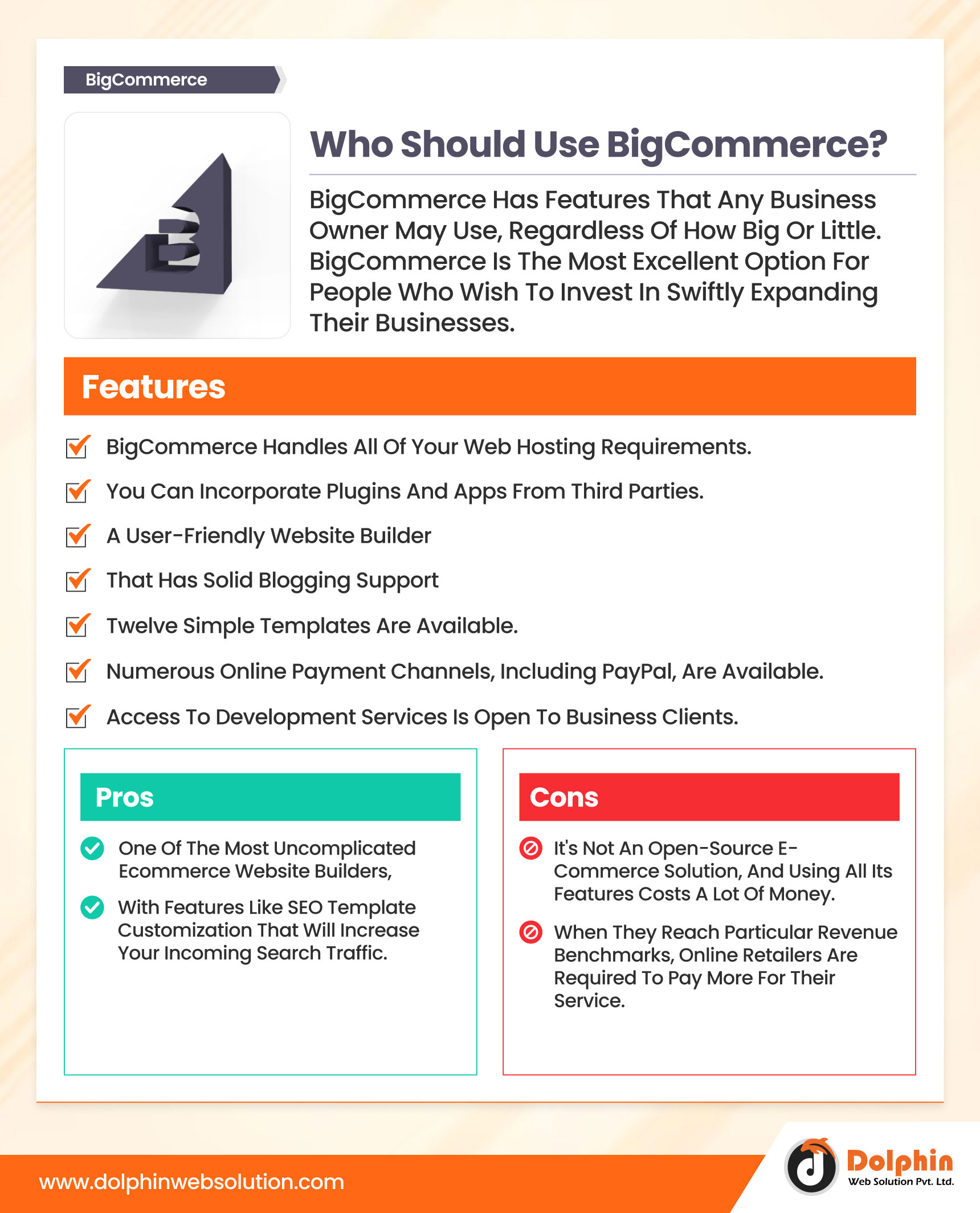
Features:
- BigCommerce handles all of your web hosting requirements
- You can incorporate plugins and apps from third parties
- User-friendly website builder
- Solid blogging support
- Twelve simple templates are available
- Numerous online payment channels, including PayPal, are available
- Access to development services is open to business clients
Pros:
- One of the most uncomplicated ecommerce website builders
- Features like SEO template customization that will increase your incoming search traffic
Cons:
- It’s not an open-source e-commerce solution, and using all its features costs a lot of money
- When they reach particular revenue benchmarks, online retailers are required to pay more for their service
Who Should Use BigCommerce?
BigCommerce has features that any business owner may use, regardless of how big or little. BigCommerce is the most excellent option for people who wish to invest in swiftly expanding their businesses.
4. Magento
Magento is a potent and feature-rich content management system (CMS) for e-commerce that provides a complete answer for companies looking to build and run solid online storefronts. Magento offers unmatched flexibility, customization choices, and scalability because of its open-source architecture. It provides sophisticated product management, inventory tracking, and order processing capabilities and serves companies and large-scale businesses. The platform offers various themes and plugins that let enterprises customize their online stores to meet their unique requirements. With secure payment methods and different delivery choices, Magento gives clients a seamless buying experience.
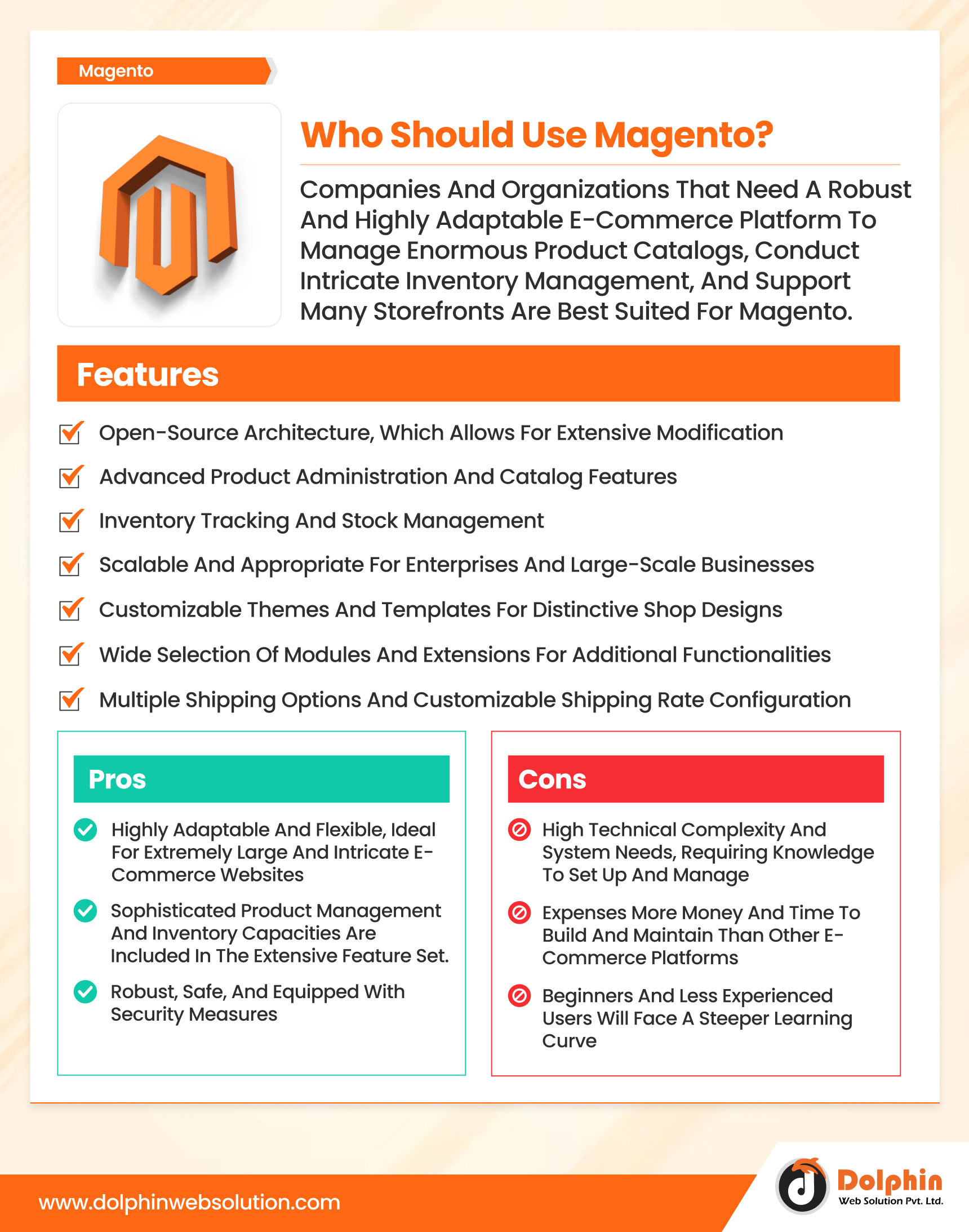
Features:
- Open-source architecture, which allows for extensive modification
- Advanced product administration and catalog features
- Inventory tracking and stock management
- Scalable and appropriate for enterprises and large-scale businesses
- Customizable themes and templates for distinctive shop designs
- Wide selection of modules and extensions for additional functionalities
- Multiple shipping options and customizable shipping rate configuration
- support for various storefronts from a single back-end; robust options for payment gateway integration
- Thorough reporting and analytics for business insights
Pros:
- Highly adaptable and flexible, ideal for extremely large and intricate e-commerce websites
- Sophisticated product management and inventory capacities are included in the extensive feature set.
- An open-source platform that allows for code modification and customization to meet specific demands
- Robust, safe, and equipped with security measures
- To manage many stores or brands, handling multiple storefronts from a single back-end is ideal.
- A broad selection of themes and plugins for increasing and customizing functionality
- For continued improvements, there is strong community support and frequent updates
- SEO-friendly features to increase visibility and search engine rankings
- Options for flexible and reliable payment gateway integration
- Detailed reporting and analytics for decision-making based on data
Cons:
- High technical complexity and system needs, requiring knowledge to set up and manage
- Expenses more money and time to build and maintain than other e-commerce platforms
- Beginners and less experienced users will face a steeper learning curve
- There are a few hosting solutions for high-performance needs. Therefore dedicated servers are frequently needed
- resource-intensive, and if not properly optimized, could result in slower loading times
- Community edition relies on community forums for troubleshooting without official help
- For smaller firms or those with basic e-commerce needs, it might be overwhelming
- A Many personalization could cause problems with third-party updates and extensions
Who Should Use Magento?
Companies and organizations that need a robust and highly adaptable e-commerce platform to manage enormous product catalogs, conduct intricate inventory management, and support many storefronts are best suited for Magento. It is the best option for companies with significant sales volumes, various products, and sophisticated client segmentation requirements. However, it may be less ideal for smaller enterprises with more straightforward e-commerce requirements.
5. Squarespace
Squarespace is the most excellent ecommerce CMS for you if you’re starting in the online business world. This is because it is the most accessible ecommerce platform for beginners.
Almost anyone can develop a stunning and valuable online presence using Squarespace. Their drag-and-drop editor makes it simple to customize their industry-leading templates, widely regarded as the best in the business.
In a method that doesn’t burden the customer, their e-commerce platform also incorporates several essential features, such as hosting and payment processing. They also provide a mobile-focused design like their mobile commerce shopping cart.
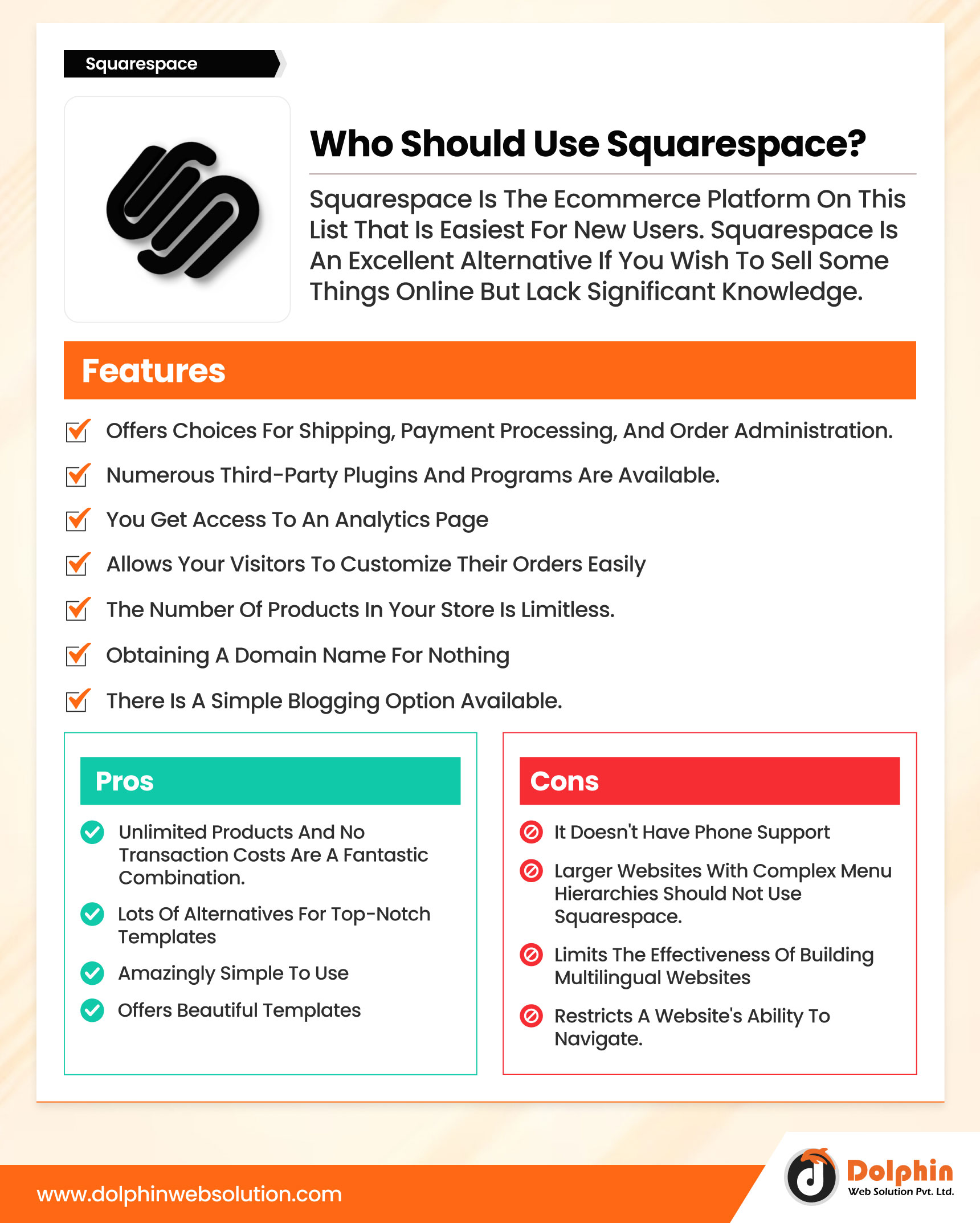
Features:
- Offers choices for shipping, payment processing, and order administration
- Numerous third-party plugins and programs are available
- You get access to an analytics page
- Allows your visitors to customize their orders easily
- The number of products in your store is limitless
- Obtaining a domain name for nothing
- There is a simple blogging option available
- An uncomplicated security certificate
Pros:
- Unlimited products and no transaction costs are a fantastic combination
- Lots of alternatives for top-notch templates
- Amazingly simple to use
- Offers beautiful templates
- Provide effective online training opportunities
- Simple to set up at first
- The learning curve to use the dashboard features is mild
- Good analytics monitor the fundamental traffic information that is necessary for decision-making
Cons:
- It doesn’t have phone support (although there’s a 24-hour live chat option)
- Larger websites with complex menu hierarchies should not use Squarespace
- Limits the effectiveness of building multilingual websites
- Restricts a website’s ability to navigate
- Google’s Page Speed Tool gives Squarespace designs a poor rating
- On smartphones, slow pages may result in a poor user experience
- The curve of Learning for Advanced Users
- Transaction Fees for E-Commerce
- Not as Good for Large-Scale E-commerce
Who Should Use Squarespace?
Squarespace is the ecommerce platform on this list that is easiest for new users. Squarespace is an excellent alternative if you wish to sell some things online but lack significant knowledge.
Conclusion
In determining the optimal CMS for your e-commerce website, it all boils down to your unique needs, financial constraints, and future aspirations. Key factors to ponder include user-friendliness, scalability, customization capabilities, and seamless integration with external tools while arriving at your final choice. With the right platform, you can now easily create a cutting-edge website for your business because the ecommerce sector has improved substantially in recent years. To assist you in making an informed choice as you develop your online store, we’ve listed the top five ecommerce content management systems to launch a website within 2023 and talked about their features and capabilities. We anticipate that our in-depth advice will arm you with the knowledge you need to select the platform that most effectively meets the requirements of your store. Hire Ecommerce Developer to integrate CMS into your website and get your product business online today!

Hello!
Click one of our contacts below to chat on WhatsApp


